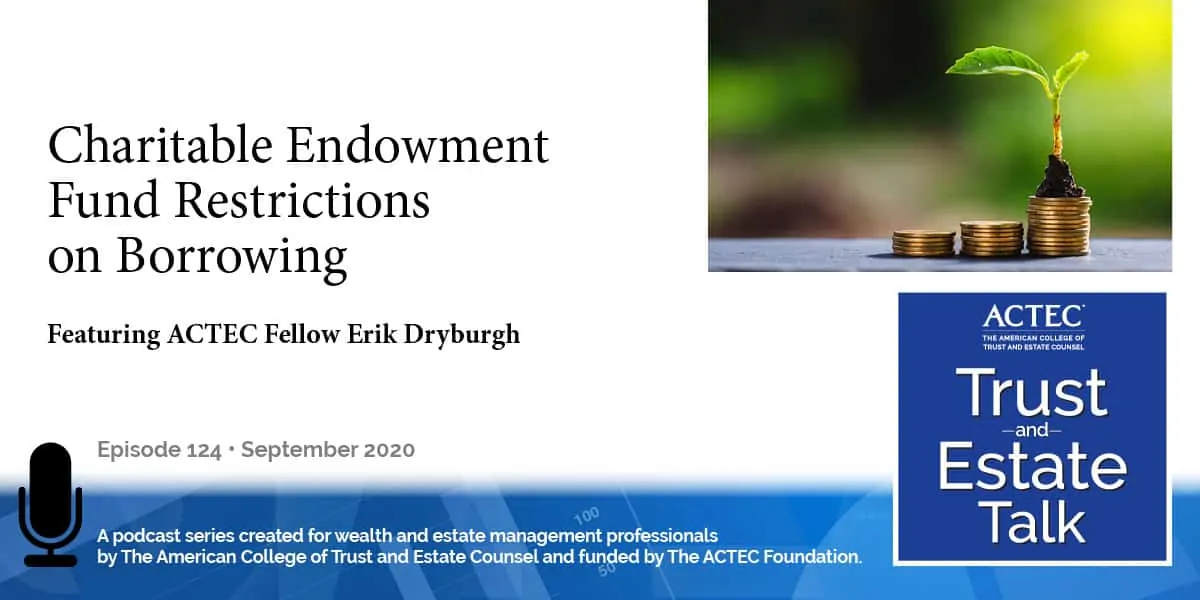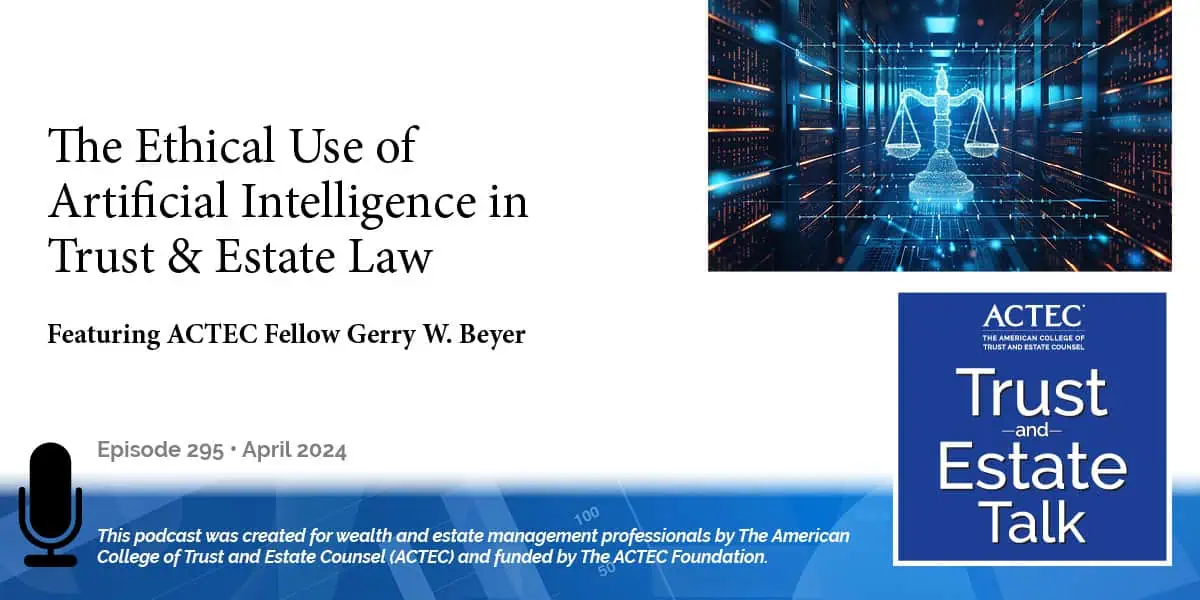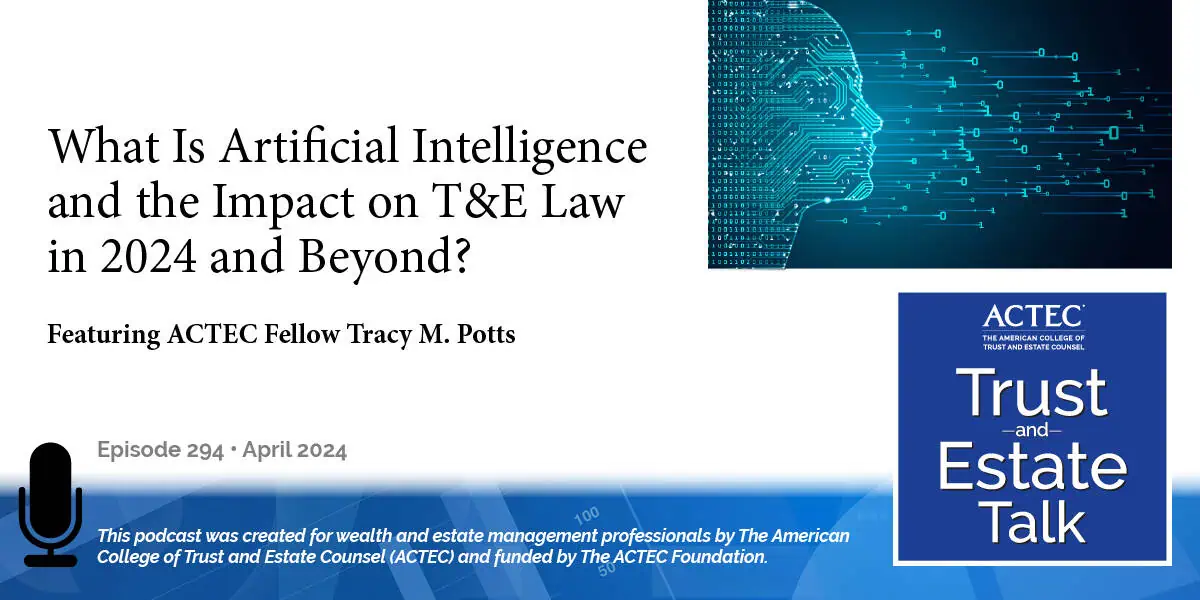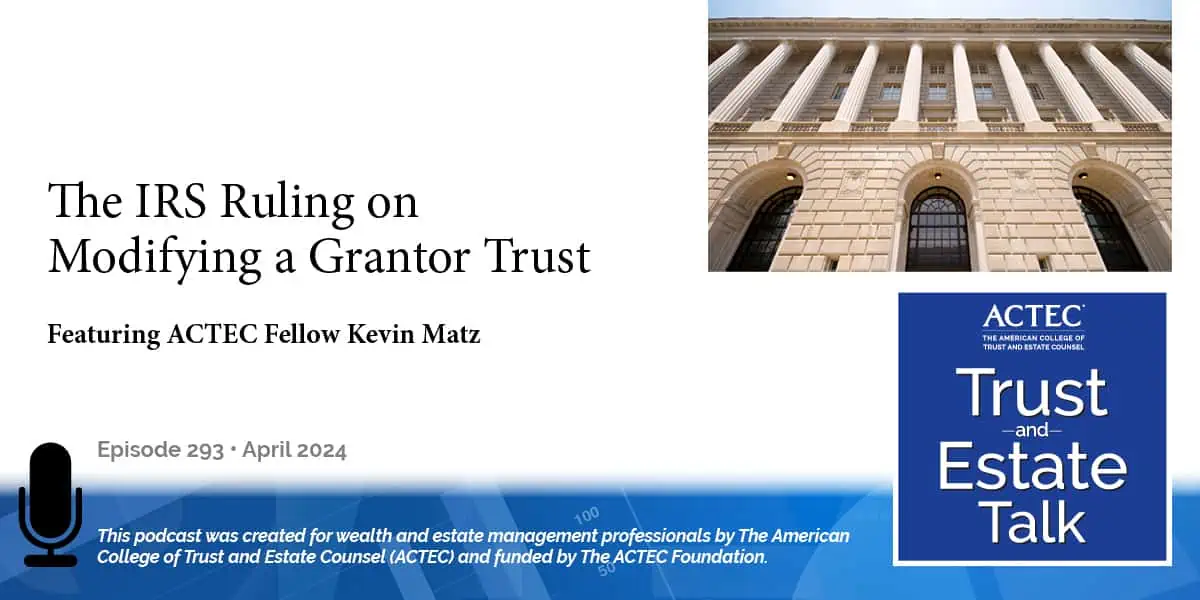Charitable Endowment Fund Restrictions on Borrowing

“Charitable Endowment Fund Restrictions on Borrowing,” that is the subject of today’s ACTEC Trust and Estate Talk.
Transcript/Show Notes
This is Susan Snyder, ACTEC Fellow from Chicago, IL. At a recent ACTEC meeting, a panel of ACTEC Fellows discussed Charities in a Time of Crisis. Today’s podcast presents the first of two excerpts from that panel. The 2020 economic crisis has severely impacted many charities causing them to look for alternative ways to meet financial mission objectives. Charities may begin to think about taking a loan from their endowment fund. Erik Dryburgh, ACTEC Fellow from San Francisco, here tells us more about borrowing restrictions on charitable endowment funds.
We’re to trying to address the financial crisis that a lot of our charities have found themselves in. As you can well imagine, charities that are revenue-based, museums for example, with shelter in place have seen their revenue go to zero. Charities that are donation based have found donors are a little less willing to give in these times of uncertainty and donors that are willing to give are redirecting to the kind of current issues at hand and less so to some of the more traditional causes; so they’re seeing a big drop in donation revenue and that leads to some real financial tension. One of the first things that charities, in my experience too, when they’re under financial pressures, they kind of look around for any pot of money and lo and behold — over there in the corner is the endowment, and why don’t we just go tap into the endowment? This has been a long-standing issue. I think we’ve seen it plenty of times before, but it’s really sort of heightened in our current situation. And, the first question that we tend to get a lot is, well, can I borrow from the endowment? And some people try to cast that as an investment, but I don’t really, frankly, buy that. I really think a loan is a contract. And to have a contract, you have to have two parties, a promisor and a promisee. In this case, you need to have a lender and a borrower. And I don’t really think you have, in a charity, two different parties. Some people try to say, well, we’ve got the finance committee on the one side; they’re in charge of the endowment. We have the executive committee on the other side. They kind of represent the operating side of the charity. I’m sorry, there is one organization; there is one board.
I sometimes try to get people to picture what that loan document would look like. Who’s going to be signing as the borrower? Who’s going to be signing as the lender? And the answer is well, the president is going to sign on both lines. That’s a little hard. When that doesn’t resonate quite enough, I figuratively, not literally, try to get the board to stand on two sides of the room. I want you folks over here to be on the endowment side. You’re the lender. I want you folks over here to be on the operating side. You’re the borrower. Now we’re going to roll this forward to where the charity actually defaults because it cannot pay back the endowment for the loan, and I just want to make sure I know who my plaintiffs and defendants are in that lawsuit. And all of a sudden, we start having a problem. So, I do think it is problematic.
Now I should note that some charities have their endowment in a separate legal entity. A lot of the health care organizations, occasionally university, institutions have a separate foundation that handles the charitable gift planning functions; and often that’s where the endowment is. Now you at least have two different parties, two different legal entities, and I think you can structure a loan. That then starts to get the question of what are the terms going to be — interest rate, securities? To what extent does this have to look like a fair market value loan you would get from a third-party bank; and if you get to the point where you think, yeah, it needs to pretty much look like what a bank would want in terms –why don’t you just go to the bank?
But, I do think internal borrowing is a problem. The Massachusetts Attorney General has issued some guidance, suggesting that they are not at all comfortable with that. I will note that our AG out in the state of California has likewise put out a document that also says, we think that is not permitted. Just as a quick side note, I would recommend that folks look at that material that’s been handed out from the Attorney General of California because they have some interesting discussion on how to hold board meetings under shelter in place and some useful board governance guidance there.
I do think there are a couple of ways to think about borrowing from endowment. One is — I’m a firm believer that these sort of donor restrictions, charitable trust restrictions, are really a matter of the donor and the charity contract, if you will, and donor intent rules in a lot of these situations. So I think if you can have a donor to the endowment authorize the borrowing, and in some way agree in writing — but talk about consenting to the borrowing, I think then maybe, you know, we would find that that is a permissible use of the endowment.
I hope you enjoyed Eric Dryburgh’s review of the guidance on charitable endowment funds and borrowing restrictions. Next week’s podcast will feature our second and final excerpt from Charities in a Time of Crisis.
This podcast was produced by The American College of Trust and Estate Counsel, ACTEC. Listeners, including professionals, should under no circumstances rely upon this information as a substitute for their own research or for obtaining specific legal or tax advice from their own counsel. The material in this podcast is for information purposes only and is not intended to and should not be treated as legal advice or tax advice. The views expressed are those of speakers as of the date noted and not necessarily those of ACTEC or any speaker’s employer or firm. The information, opinions, and recommendations presented in this Podcast are for general information only and any reliance on the information provided in this Podcast is done at your own risk. The entire contents and design of this Podcast, are the property of ACTEC, or used by ACTEC with permission, and are protected under U.S. and international copyright and trademark laws. Except as otherwise provided herein, users of this Podcast may save and use information contained in the Podcast only for personal or other non-commercial, educational purposes. No other use, including, without limitation, reproduction, retransmission or editing, of this Podcast may be made without the prior written permission of The American College of Trust and Estate Counsel.
If you have ideas for a future ACTEC Trust & Estate Talk topic, please contact us at ACTECpodcast@ACTEC.org.
© 2018 – 2024 The American College of Trust and Estate Counsel. All rights reserved.
Latest ACTEC Trust and Estate Talk Podcasts

The Ethical Use of Artificial Intelligence in Trust & Estate Law
A law professor offers insights into the risks, rewards, duties and ethical considerations of lawyers using AI in their T&E practices.

What Is Artificial Intelligence and the Impact on T&E Law in 2024 and Beyond?
A primer on the types and uses of AI, then a deeper dive into the impact on trust and estate law from types to applications to ethical considerations.

The IRS Ruling on Modifying a Grantor Trust
Explore the gift tax implications for trust beneficiaries modifying grantor trusts in IRS CCA 202352018, with nuanced analysis and estate planning insights.

